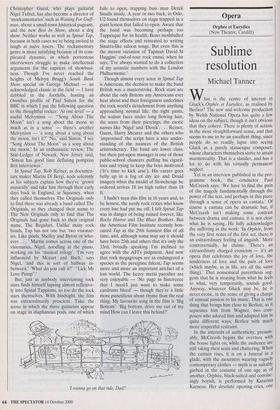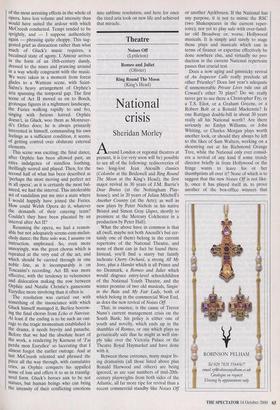Opera
Orphee et Eurydice (New Theatre, Cardiff)
Sublime resolution
Michael Tanner
What is the centre of interest in Gluck's Orphee et Eurydice, as realised by Berlioz? The new and welcome production by Welsh National Opera has quite a few ideas on the subject, though it isn't obvious that they cohere. There is plenty of action, in the most straightforward sense, and that seems to me to be an excellent thing, since people do so readily lapse into seeing Gluck as a purely statuesque composer, whose characters themselves strive to attain marmorcality. That is a slander, and has a lot to do with his virtually permanent neglect.
Yet in an interview published in the pro- gramme book, the conductor Paul McCreesh says: 'We have to find the pain of the tragedy fundamentally through the power of the text, and perhaps in this piece through a sense of opera as cantata.' Of course a cantata can be dramatic but, if McCreesh isn't making some contrast between drama and cantata, it is not clear what he is saying. He fully acknowledges the suffering in the work: In Orphee, from the very first notes of the first act, there is an extraordinary feeling of anguish.' More controversially, he claims: 'There's an extraordinary charged eroticism — it's an opera that celebrates the joy of love, the tenderness of love and the pain of love (which maybe, as in life, are all the same thing).' That nonsensical parenthesis sug- gests that he is straying from what he feels to what, very temporarily, sounds good. Anyway, whatever Gluck may be, he is never erotic, in the sense of giving a charge of sensual passion to his music. That is one thing that brings him close to Berlioz, as it separates him from Wagner, two com- posers who adored him and adapted him in quite different ways; Berlioz with much more respectful restraint.
In the interests of authenticity, presum- ably, McCreesh begins the overture with the house lights on, while the audience are still taking their seats and chattering. When the curtain rises, it is on a funeral in a glade, with the mourners wearing vaguely contemporary clothes — myth is as suitably garbed in the costume of one age as of another. Orphee, black-suited and convinc- ingly boyish, is performed by Katarina Karneus. Her desolate opening cries, one
of the most arresting effects in the whole of opera, have less volume and intensity than would have suited the ardour with which McCreesh conducted. Tempi tended to be sprightly, and — I suppose authenticity again — phrasing quite choppy. This sug- gested grief as distraction rather than what much of Gluck's music requires, a becalmed state of agony. L'Amour arrives in the form of an 18th-century dandy, dressed to the nines and prancing around in a way wholly congruent with the music. We were taken in a moment from forest glades to a Watteau scene, with Saint- Saens's heavy arrangement of Orphee's aria spanning the temporal gap. The first scene of Act II moved us on to Bosch, grotesque figures in a nightmare landscape, the Furies walking rapidly to and fro, singing with furious hatred. Orphee doesn't, in Gluck, woo them as Montever- di's Orfeo does; he is always primarily interested in himself, commanding his own feelings as a sufficient condition, it seems, of getting control over obdurate external elements.
This scene was exciting; the final dance, after Orphee has been allowed past, an extra indulgence of mindless loathing, thrillingly scored and played. Then, for the second half of what has been described as `perhaps the most moving and perfect act in all opera', as it is certainly the most bal- anced, we had the interval. This intolerable act of vandalism put me into a state where I would happily have joined the Furies. How could Welsh Opera do it, whatever the demands of their catering team? Couldn't they have been placated by an interval after Act II?
Resuming the opera, we had a reason- able but not adequately serene-cum-melan- choly dance; the flute solo was, I assume on instruction, unphrased. So, even more annoyingly, was the great chorus which is repeated at the very end of the act, and which should be carried through in one noble line, as it incomparably is on Toscanini's recording. Act III was more effective, with the tendency to vehemence and dislocation making the row between Orphee and Natalie Christie's gamesome Eurydice more involving than it often is.
The resolution was carried out with something of the insouciance with which Gluck himself managed it, Berlioz borrow- ing the final chorus from Echo et Narcisse. At least if the ending is to be such an out- rage to the tragic momentum established in the drama, it needs brevity and panache. Before that we had the absolute heart of the work, a rendering by Karneus of Tai perdu mon Eurydice' so lacerating that I almost forgot the earlier outrage. And at last McCreesh relented and phrased the piece all the way through, with cumulative cries, as Orphee conquers his appalled sense of loss and offers it to us in transfig- ured form. Gluck's heroes aim to be not statues, but human beings who can bring the intensity of their conflicting emotions into sublime resolution, and here for once the tired aria took on new life and achieved that miracle.



















































































 Previous page
Previous page